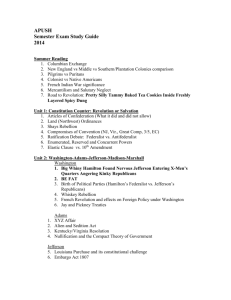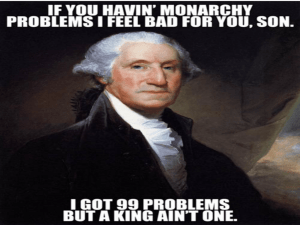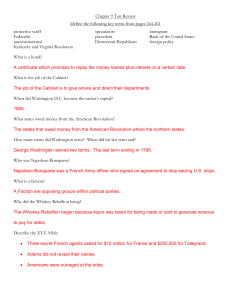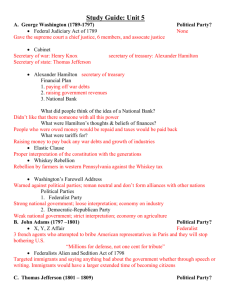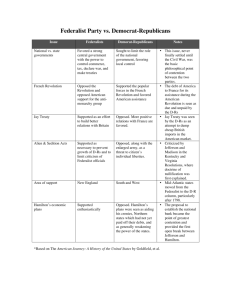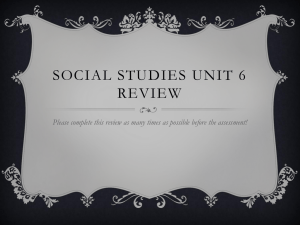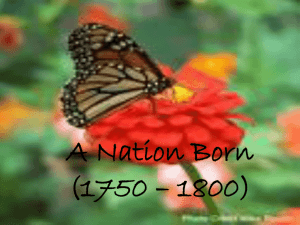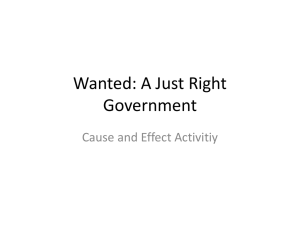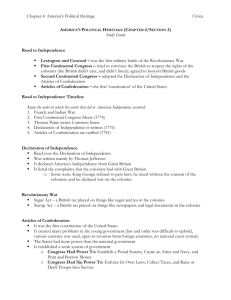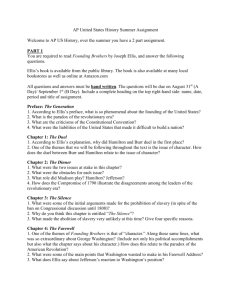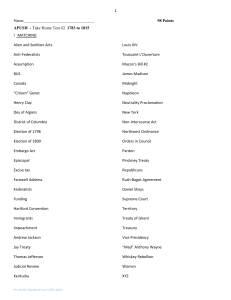Founding a Nation
advertisement
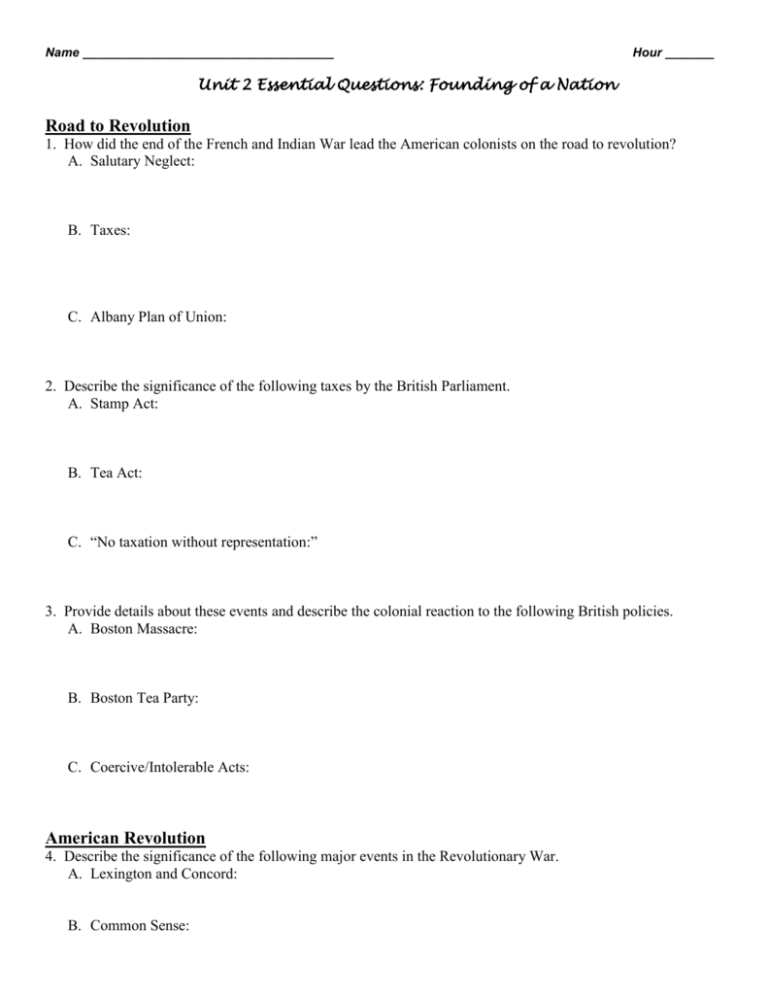
Name ____________________________________ Hour _______ Unit 2 Essential Questions: Founding of a Nation Road to Revolution 1. How did the end of the French and Indian War lead the American colonists on the road to revolution? A. Salutary Neglect: B. Taxes: C. Albany Plan of Union: 2. Describe the significance of the following taxes by the British Parliament. A. Stamp Act: B. Tea Act: C. “No taxation without representation:” 3. Provide details about these events and describe the colonial reaction to the following British policies. A. Boston Massacre: B. Boston Tea Party: C. Coercive/Intolerable Acts: American Revolution 4. Describe the significance of the following major events in the Revolutionary War. A. Lexington and Concord: B. Common Sense: C. Bunker Hill: D. Declaration of Independence: E. Saratoga: F. Yorktown: 5. Describe the significance of the following individuals in the Revolutionary War. A. George III: B. George Washington: C. Thomas Jefferson: D. Friedrich von Steuben: E. Marquis de Lafayette: Forming a New National Government 6. Describe the impact of the following on the creation of the new national government. A. Iroquois Confederation: B. Virginia House of Burgesses C. Declaration of Independence: D. Articles of Confederation: 7. How effective was the Articles of Confederation in ruling the new nation? A. Strengths: B. Weaknesses: 8. Describe the plans and compromises of the Constitutional Convention. A. Virginia Plan: B. New Jersey Plan: C. Great Compromise: D. 3/5 Compromise: 9. What role did James Madison play at the Constitutional Convention? 10. Compare the ideas held by the Federalist and the Anti-Federalists. A. Federalists: B. Anti-Federalists: 11. What were the Federalist papers? A. Who wrote them? B. Describe the ratification process of the US Constitution? The Early Republic 12. Describe the precedents (examples) set by George Washington. 13. Compare the two political parties of the first party system. A. Federalist Party /Alexander Hamilton: B. Democratic Republicans / Thomas Jefferson: 14. Describe the economic policies of Alexander Hamilton. 15. Explain the contributions of John Marshall in the establishment of the Judicial Branch as an equal branch of government? A. Describe judicial review. 16. Compare the ideas and contributions of two Founding Fathers (Washington, Jefferson, Hamilton, Marshall). Unit 2 Review: Founding of a Nation 1. Why did the colonists openly protest the Stamp Act? 2. The Albany Plan of Union was influenced by the ______________________________________. 3. How did the colonists react to the Tea Act passed by Britain? 4. Which act led directly to the formation of the First Continental Congress? 5. What two battles started the Revolutionary War? 6. What was the first major battle of the Revolutionary War? 7. The Pamphlet Common Sense united colonists because it stated: 8. What does the Declaration of Independence say people should do if government abuses power? 9. Who was the American delegate who actually wrote the Declaration of Independence? 10. What was the significance of the Battle of Saratoga? 11. Describe the help from abroad that the Continental Army received during the war. 12. ____________________________ was the American traitor that nearly gave up West Point. 13. What was the significance of the Battle of Yorktown in the American Revolution? 14. Who was the King of England during the American Revolution? 15. Describe three reasons the colonists fought for independence. 16. Describe three weaknesses of the Articles of Confederation. Highlight the greatest weakness. 17. The purpose of the 1787 Constitutional Convention was to ____________________________________. 18. Who was the “Father of the Constitution?” 19. The main disagreement between the Virginia Plan and the New Jersey Plan centered on ____________. 20. Identify two details associated with the Three-Fifths Compromise. 21. The Great Compromise satisfied both large and small states by creating a ________________________. 22. Anti-Federalists believed a ______________________________needed to be added to the Constitution. 23. What was the purpose of the Federalist Papers? 24. Describe three ideas that were embraced by the Federalists, led by Alexander Hamilton. 25. Describe three ideas that were incorporated by the Democratic Republicans, led by Thomas Jefferson. 26. Name three precedents established by George Washington during his presidency. 27. Who established the Supreme Court as a co-equal third branch of government? 28. How did the Supreme Court define its power of judicial review in the case of Marbury vs. Madison? Short Answer: Write a paragraph providing enough details to answer the following prompts. Describe three events that led to the American Revolution. How effective was the Article of Confederation in ruling the new nation? Provide at least three specific details describing the strengths or weaknesses of this document. Describe the differences between the Virginia Plan and the New Jersey Plan. Compare the ideas and contributions of two Founding Fathers (George Washington, Thomas Jefferson, Alexander Hamilton, or John Marshall).
